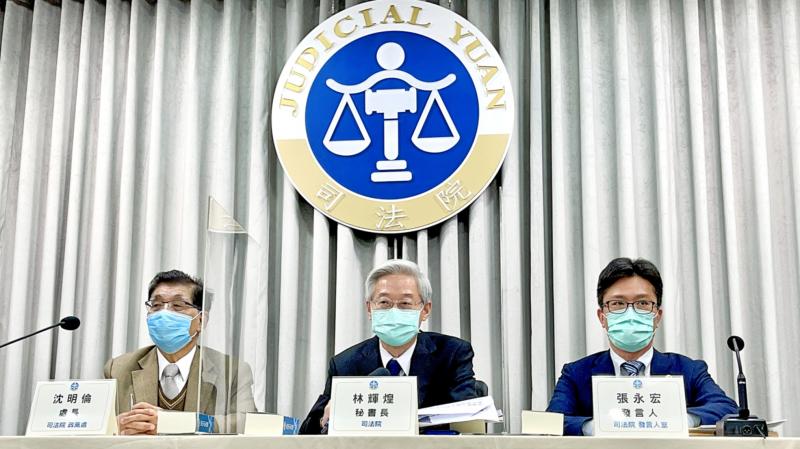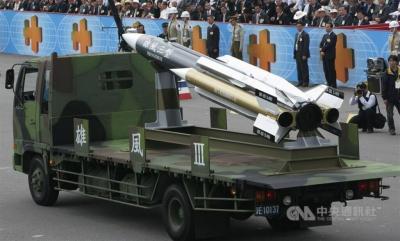Twenty Supreme Court and High Court judges and senior officials, along with 20 prosecutors and judicial investigators, were found to have engaged in illegal activities such as bribe-taking, abuse of authority and conflict of interest, according to a Judicial Yuan report released yesterday.
The report confirmed earlier Control Yuan’s findings that embroiled more than 200 judicial personnel in a corruption scandal involving former Supreme Court judge Shih Mu-chin (石木欽) and Chia Her Industrial Co president Weng Mao-chung (翁茂鍾).
The report recommended disciplinary measures and punishment against the 40 officials, including for judges presiding over nine cases involving Weng starting in the late 1990s, for which he received favorable rulings.

Photo: George Tsorng, Taipei Times
According to the report, Shih, who was president of the High Court, became a close friend of Weng when litigation involving him began in 1997.
Through Shih, Weng was introduced to more than 200 judges, prosecutors and police officials through banquets and personal visits, the report said.
The officials were alleged to have received bribes and lavish gifts, including company stock, in exchange for using their influence to aid Weng.
The Control Yuan in August last year began impeachment proceedings against Shih over alleged contraventions of the Judges Act (法官法) and suspicion of failing to avoid conflicts of interest.
In presenting the findings at a news conference in Taipei, Judicial Yuan Secretary-General Lin Hui-huang (林輝煌) said that the 20 judges involved had committed serious misconduct, and would face punishment to be determined by its disciplinary committee.
Seven of the judges found to have been most involved in abusing their authority face further investigation from the Control Yuan for possible impeachment, he said.
These include former Supreme Court judge Yen Nan-chuan (顏南全), former Supreme Administrative Court president Lin Chi-fu (林奇福), former Supreme Court chief judge Wu Hsiung-ming (吳雄銘), and former Tainan District Court judge Su Yi-chou (蘇義洲).
Some officials would be dismissed or transferred from their offices, with the possibility of losing their pension, as would retired officials implicated in the report, Lin said.
Some could evade punishment, as the allegations involving some officials are older than 10 years, past the statute of limitations on certain breaches under the Judges Act (法官法), he added.
Minister of Justice Tsai Ching-hsiang (蔡清祥) told a separate news conference in Taipei yesterday that 11 former head prosecutors, and nine officials and investigators at the Ministry of Justice Investigation Bureau were involved in the case, some of whom allegedly attended Weng’s banquets more than five times, while others allegedly purchased stocks based on insider information from Weng.
They would be punished as part of internal administrative procedures, Tsai said.
Judicial Reform Foundation chairman Lin Yung-sung (林永頌) said the case had severely eroded faith in the nation’s justice system.
The foundation called on lawmakers to amend the act to include a mechanism for evaluating judges and scrutinizing judicial officials.
“This scandal has shown that our justice system is rotten to the core,” Lin said. “Any further talks about the need for reform are useless, because people do not believe that judicial reform has made any progress.”
Lin also demanded that Judicial Yuan President Hsu Tzong-li (許宗力) and Tsai publicly apologize over the scandal.
Lin and other judicial reform proponents said that the report was only halfway finished.
They urged the Control Yuan to conduct a more thorough probe, by requisitioning all materials pertaining to the case, along with Weng’s 27 notebooks allegedly recording details of meetings, banquets, gifts and insider trading activities.
“This is necessary to find out if these judges have interfered in other court cases where they had a conflict of interest or received other undue financial benefits,” Lin said.
He said that Premier Su Tseng-chang (蘇貞昌) should oversee the investigation, since high-ranking police officials were allegedly involved and had refused to cooperate with the Control Yuan’s probe.

STATS: Taiwan’s average life expectancy of 80.77 years was lower than that of Japan, Singapore and South Korea, but higher than in China, Malaysia and Indonesia Taiwan’s average life expectancy last year increased to 80.77 years, but was still not back to its pre-COVID-19 pandemic peak of 81.32 years in 2020, the Ministry of the Interior said yesterday. The average life expectancy last year increased the 0.54 years from 2023, the ministry said in a statement. For men and women, the average life expectancy last year was 77.42 years and 84.30 years respectively, up 0.48 years and 0.56 years from the previous year. Taiwan’s average life expectancy peaked at 81.32 years in 2020, as the nation was relatively unaffected by the pandemic that year. The metric

Taiwan High Speed Rail Corp. (THSRC) plans to ease strained capacity during peak hours by introducing new fare rules restricting passengers traveling without reserved seats in 2026, company Chairman Shih Che (史哲) said Wednesday. THSRC needs to tackle its capacity issue because there have been several occasions where passengers holding tickets with reserved seats did not make it onto their train in stations packed with individuals traveling without a reserved seat, Shih told reporters in a joint interview in Taipei. Non-reserved seats allow travelers maximum flexibility, but it has led to issues relating to quality of service and safety concerns, especially during

A magnitude 5.1 earthquake struck Chiayi County at 4:37pm today, the Central Weather Administration (CWA) said. The hypocenter was 36.3km southeast of Chiayi County Hall at a depth of 10.4km, CWA data showed. There were no immediate reports of damage resulting from the quake. The intensity of the quake, which gauges the actual effect of a seismic event, measured 4 in Chiayi County, Tainan and Kaohsiung on Taiwan's seven-tier intensity scale, the data showed. The quake had an intensity of 3 in Chiayi City and Yunlin County, while it was measured as 2 in Pingtung, Taitung, Hualien, Changhua, Nantou and Penghu counties, the data

The Supreme Court today rejected an appeal filed by former Air Force officer Shih Chun-cheng (史濬程), convicted of Chinese Communist Party (CCP) espionage, finalizing his sentence at two years and two months for contravening the National Security Act (國家安全法). His other ruling, a ten-month sentence for an additional contravention, was meanwhile overturned and sent to the Taichung branch of the High Court for retrial, the Supreme Court said today. Prosecutors have been notified as Shih is considered a flight risk. Shih was recruited by Chinese Communist Party (CCP) intelligence officials after his retirement in 2008 and appointed as a supervisor